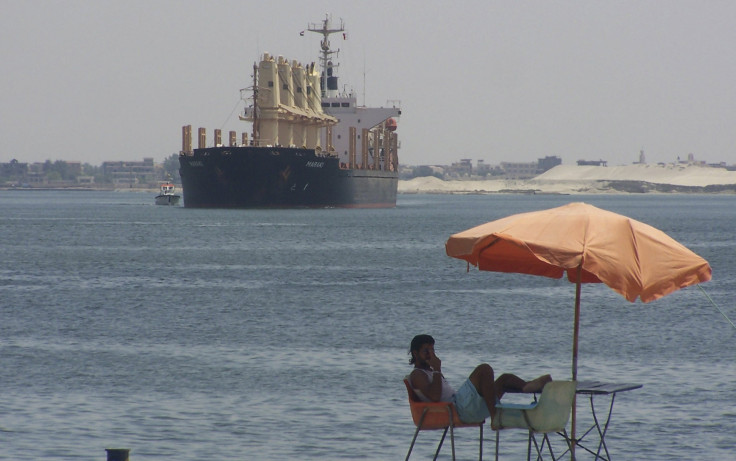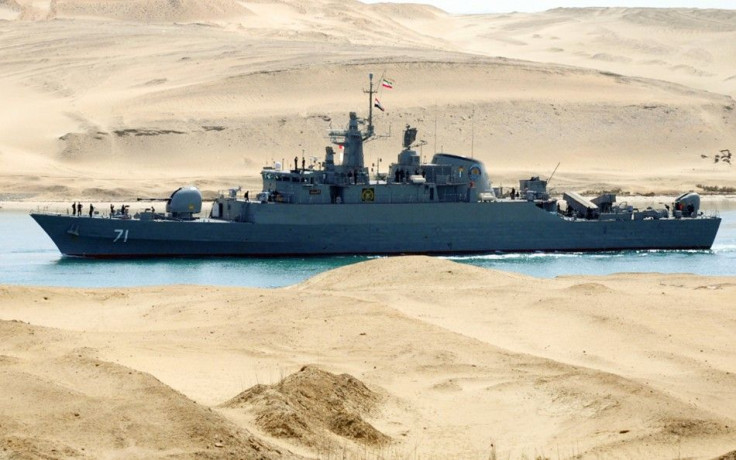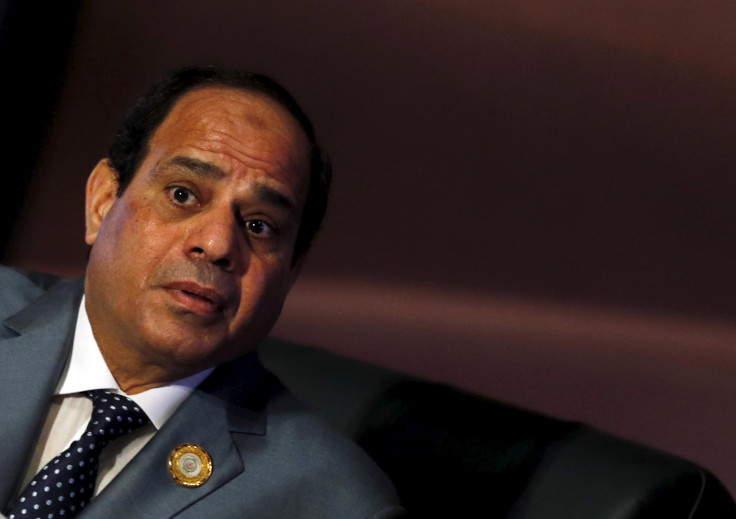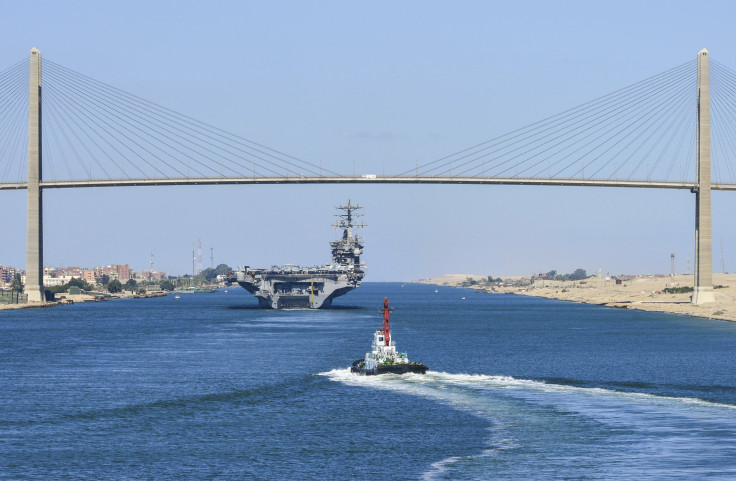Sisi’s New Suez Canal: Egypt’s Great Development Project Might Not Develop Anything

ISMAILIA, Egypt -- Fireworks, an air show and an opera are all part of the $30 million celebration taking place Thursday in the Egyptian city of Ismailia as President Abdel Fattah el-Sisi inaugurates the New Suez Canal. Around the country, Egyptians are watching the fanfare on live streams broadcast on public mega-screens and TV channels, enjoying the day off work after the Cabinet declared it a national holiday.
For weeks, banners, posters and even passport stamps have heralded the expansion of the canal as “Egypt’s gift to the world.” The addition of a second shipping lane along a 35 km stretch of the canal promises to cut transit time from 18 hours to 11. More important than time however, is the money. The Suez Canal Authority is banking on daily traffic to double by 2023 -- going from 49 to 97 vessels per day. This would allow the canal to more than double its yearly revenue -- from $5.3 billion to more than $13 billion.
But to Egypt’s 90 million citizens, the canal is about more than numbers.
“The New Suez Canal is more than just a new waterway and an astonishing feat of engineering,” said Adm. Mohab Mameesh, chairman and managing director of the Suez Canal Authority. “It is a catalyst for the Egyptian people which will unleash a renewed sense of pride and a more prosperous future.”
Ever since former President Gamal Abdul Nasser nationalized the canal in the 1960s, it has served as a source of national pride for Egypt; proof of the country’s independence from colonizers and confirmation of its ability to determine its economic future. By reclaiming the Suez Canal for Egypt, Nasser has gone down in history as a national hero, despite his economic failings and embarrassing military loss to Israel.

Sisi is taking a page directly out of Nasser’s playbook -- something his whole political career hinges on.
Since 2013, Sisi has relied almost exclusively on nationalism to maintain the support of his people despite a bleak economic forecast, a major fuel crisis, high levels of unemployment and a growing insurgency in the Sinai Peninsula. For him, the new Suez Canal is far more than just an economic development project; it's the very foundation of his nationalism campaign and a symbol of his right to rule.
That’s why a year ago, Sisi announced that the expansion project, originally designed to take three years, would be completed in one. The plan has its outspoken critics, with former Suez Canal Authority member Wael Kaddour alleging in some news reports that the decision to shorten the timeline “doubled construction costs.”
Political theorist Amr Adly, a scholar at the Carnegie Endowment’s Middle East Center, believes the reason to push the timeline forward is political.
“Sisi was in a rush to show that he was doing something, that he’s delivering,” Adly said. "This project supports Sisi’s legitimacy, a legitimacy based on achievement. ... It’s a politics of waiting, of saying ‘We’re doing something, you can see this, you just have to wait.’”
Sisi has pulled through on his ambitious timeline, but at a high cost. To finish dredging the more than 240 million cubic meters on time, Egypt had to hire foreign contractors at the price of $2 billion -- a quarter of the project’s entire budget. This wrecked Sisi’s original promise to employ only Egyptian firms for the project.

Sisi also originally announced that the project would be funded entirely through bonds -- and indeed, the state managed to raise its entire budget of $8 billion within a week, selling 88 percent of those certificates to ordinary citizens. The Suez Canal Authority has already begun paying quarterly dividends on the 12 percent bonds and plans to repay the principal within the next five years. The popular funding scheme was heralded an unmitigated success and a sign of the nation’s support for Sisi. However, because of the tightened timeline, the authority has gone nearly $1 billion over budget, and has to fill in the gap with two short-term loans from local banks.
In its haste to complete the project on time, the authority has also displaced more than 2,000 residents of the villages of Qantara Sharq and Abtal whose homes were in the way of the new shipping lane.
“These families were given very little notice prior to their eviction -- just around one week -- and have not received any concrete form of compensation. Only promises from the officials involved in the New Suez Canal Project,” Egyptian lawyer Sherine Al Haddad told local media.
And now, after this grand effort to get the waterway open on time, experts remain skeptical as to whether it can even achieve the ambitious projections the state has been boasting.

To achieve the revenues expected by 2023, shipping through the canal will have to increase about 9 percent per year, with no declines in traffic. As the last four years have seen an increase of only between 3 and 4 percent, a new report on the project issued by Capital Economics states that the projection “seems unlikely, to say the least.”
Neil Davidson, an analyst with Drewry Shipping, was also skeptical. “The demand for the Suez Canal is influenced by a number of factors. Shipping costs are part of the equation, but just one small part,” he said. “However, simply expanding the canal does not automatically generate more traffic for it. To be able to say whether the government's predictions are realistic it would be necessary to see the detailed trade and traffic modelling. ... To my knowledge this analysis has not been made public.”
However, even if the canal does reap generous profits, the grand expansion will have little direct effect on the lives of ordinary Egyptians, Adly said.
“The new Suez Canal is only likely to increase the revenue that goes to the state office,” Adly said. “This is important as it is all in U.S. dollars, which the state badly needs, but the canal is not likely to generate employment for citizens in any direct manner. It has engaged employees in the digging process, but that’s done now.”
Citizens looking to benefit directly from the canal in the long term will have to wait for today’s expected announcement regarding Sisi’s plans for the “New Suez Canal Zone.” To date, the state has released little information about its plans to develop a $15 billion industrial and logistics hub along the banks of the canal, but this is where ordinary citizens stand to benefit the most in the long-term should it materialize, Adly said.
In the end, this much is clear: The gleaming new Suez Canal being unveiled today is as much a campaign to rally national support for the new regime as it is a true economic development project.
“Of course the Suez Canal has its own symbolism,” Adly said. “But even if this contributes to Egypt’s economy, there need to be other reforms. There is no direct relation between economic growth and political stability.”
© Copyright IBTimes 2024. All rights reserved.




















